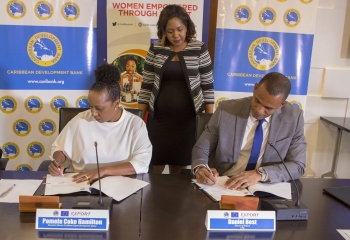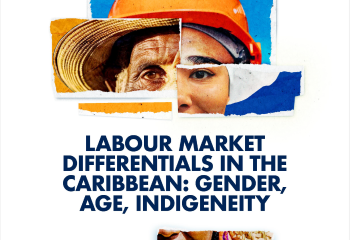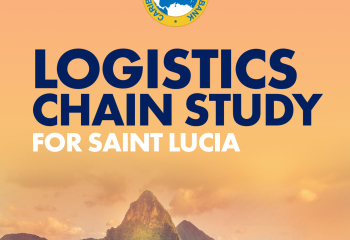Keynote: AfriCaribbean Trade and Investment Forum (ACTIF23)
It is my distinct honour and privilege to address you in this land whose slogan is “One People, One Nation, One Destiny” — indeed a fitting summary of who we are and can be!
Let me begin by thanking my brother President Ali, Professor Oramah and the African Export-Import Bank (Afreximbank), and the conference organisers for extending an invitation to the Caribbean Development Bank (CDB) to join you in these deliberations.
Colleagues, today we gather to explore ways to overcome financing constraints and propose innovative ‘future-fit’ solutions to facilitate the blossoming and blooming of Africa-Caribbean trade and investment cooperation. In fact, I view this as an investment opportunity in altering the narrative of the middle passage to the creation of a future path underwritten by unity, solidarity, and partnership to harness the potential of our collective creativity and ingenuity. Consequently, my remarks will be set in the realm of how we can use trade to move our economies from the periphery to the centre.
At CDB, trade is considered a central pathway to the transformational agenda of our economies. This is not a new insight — it always was! Indeed, throughout our historical journey, trade and commerce have always been instrumental in knitting our societies together, fostering development, and, most importantly, in shifting powers.
However, trade between the Caribbean and Africa has traditionally been modest. According to a 2022 International Trade Center study, less than 1% of exports are exchanged between the two Regions. This must change. In the next five years, the potential exists to transform this ratio to 25% in both directions between the Regions. This potential cooperation, especially in agriculture, energy, tourism, and technology, can reframe the existing account of the Middle Passage from one of pain, trauma, and trafficking in black bodies to one of trade, technology, and geo-political strength.
Bolstering trade is mission critical for our countries to move from the periphery to the centre. Walter Rodney’s "How Europe Underdeveloped Africa" details how colonialism and economic controls influenced the continent's underdevelopment. Countries in Africa were seen primarily as sources of raw material for European industries, with little reverse-direction investment. Growth trajectories were further disrupted through the imposition of external systems, leaving these countries anchored firmly in the periphery.
In the Caribbean, we suffered a similar fate, producing sugar and other commodities for export, only to be relegated to the periphery when the centre changed their appetites and could source those products more cheaply elsewhere.
In the post-slavery post-colonial era, our economies are still organised in the context and construct of a plantation economy – of course, minus the forced labour. Sustained colonial ties, the continued provision of goods and services to a centre (Europe) and required compliance with international rules have meant that the Region has remained structurally dependent on an external centre, and being constrained in achieving economic growth and human development.
It is no secret that trade between our two Regions has challenges, including:
- inadequate transportation links (infrastructure and connectivity) between Africa and the Caribbean;
- tariffs, customs procedures, and differing regulatory standards;
- pricing competition from larger economies that overshadow bilateral trade facilitation; and
- an understandable lack of appreciation that transitions to development may require choices that view prices from a longer-run dependency and sustainability perspective and less so on today’s purchasing power.
The question is, how do we chart a different future and identify solutions that will change our situation? My friends, trade, by its very nature, is not just an exchange of commodities. It is an exchange of culture, knowledge, and progress. Both Africa and the Caribbean share a common past marked by struggle, resilience, and a continuous quest for self-definition. Our intertwined histories, born of resistance to subjugation, provide the bedrock upon which we can forge an economic partnership.
Increasing trade between Africa and the Caribbean means fortifying shared histories, strengthening shared values, and developing shared visions. This translates to customising our peculiarities to advance our circumstances, embracing resilient prosperity, technological growth, and the elevation of our shared global stance.
I ask you to indulge me and close your eyes and picture TRADE as Economic resilience - when we unlock the potential of intercontinental trade, we open doors to job creation, technological advancement, and infrastructural development. Let us reimagine a future where African technology startups are commonplace in the Caribbean and Caribbean agricultural produce is a staple in African households.
Now picture TRADE as Socio-political Shift - By enhancing trade, we indirectly fortify our global position, moving our countries from being mere spectators to active participants in the global narrative. A united AfriCaribbean bloc can redefine global trade dynamics, making our voices heard in international forums and shifting the balance of power.
Picture TRADE as the Power of Innovative Resilience: Innovation is not just a buzzword but the lifeblood of thriving economies, especially for developing nations in Africa and the Caribbean.
Nobel laureate Sir Arthur Lewis once remarked, "The fundamental cure for poverty is not money but knowledge." Indeed, it is this very knowledge, this spirit of innovation, that we must harness and cultivate. And let us be clear — we do not have a comparative disadvantage in knowledge creation! In fact, our knowledge capacity can be our playing-field leveller on the global stage, converting challenges into opportunities.
Picture now the concept of Building Prosperity through Resilience, which is not just about accumulating wealth, but ensuring that our growth is resilient to shocks, ensuring our prosperity is sustainable over the long run. However, resilience and prosperity are intertwined — to attain and sustain prosperity, we must be resilient, and the key to resilience is innovation, which can be achieved through an ecosystem approach:
- Measuring better: Refining our metrics, understanding better our specific circumstances, and then directing investments more strategically, ensuring that each dollar is truly fit for its intended purpose.
- In this regard, I propose we commit the next decade to a regional connectivity transformative backbone — a world where all of our countries are seamlessly interconnected in:
- Energy connectivity — where sustainable energy resources are shared, harnessing the abundance of one Region to address the deficit of another.
- Digital connectivity — where broadband networks bridge information gaps, fostering knowledge and technology transfer.
- Transport connectivity — integrated air and marine logistics enabling swift, efficient movement, thereby accelerating trade and integration.
- Financing: Introduce a wide class of contingent financing instruments tailored to mitigate risks from our high structural vulnerabilities and low resilience, thereby optimising the use of our abundant regional resources.
- Capacity building: Re-engineer traditional training programmes to empower our people to think creatively, act decisively, and break the shackle of dependency. Let us commit to investment in capacity building, making it an inherent component of every phase in the investment cycle.
- Partnerships: Sharing responsibilities and burdens through dynamic partnerships in knowledge creation, in financing, technology, and productivity-enhancing methods.
But how can we achieve these crucial innovations? We propose a framework that targets real development outcomes and the means to finance and implement these through promoting complementary efforts instead of constraints from siloed perspectives of private and public sector domains. That the essence of the new deal between the private and public sectors.
The finance required is more than any one institution can provide, more than any one instrument can facilitate. Hence, we have proposed a multi-source, multi-instrument approach, underpinned in partnership by an appropriate market infrastructure and good practice regulatory and governance frameworks. By working collaboratively, CDB and Afreximbank can transition our countries to the heart of global economic dynamics, recast our economies from periphery to centre, and fostering investment initiatives that promote the Sustainable Development Goals and transform the lives our people. Allow me to share with you a few financing solutions:
- Trade Facilitation and Export Promotion Fund that will offer low-interest loans, credit guarantees, or grants to businesses. Let us move with urgency to establish and finance it.
- Promote venture capital and private equity funds with a focus on trade between Africa and the Caribbean. These funds can offer financial support, mentorship, and market access in renewable energy, connectivity, food security, digitalisation, and climate mitigation and adaptation.
- Grow a regional resource mobilisation ecosystem that will allow deployment of regional resources (e.g., national insurance funds), for effecting our development agenda.
- Support an increased use of Fintech to promote the use of digital payments, peer-to-peer lending platforms, and supply chain financing.
As I conclude, I invite us to create the future we want and need – a future where every country, irrespective of size or wealth, plays an integral role in a collective, integrated march towards resilient prosperity. For us, this is not just a vision; it is a mission requiring our collective effort. Let us commit today to not just talking the talk but to the laying of flagstones along the path to resilient prosperity. Let us commit to bringing our people along with us every step of this journey, as they are the ones who must benefit from everything that we do here.
THANK YOU.




